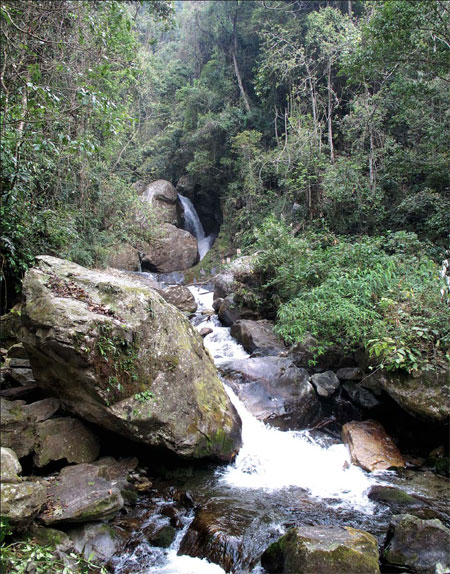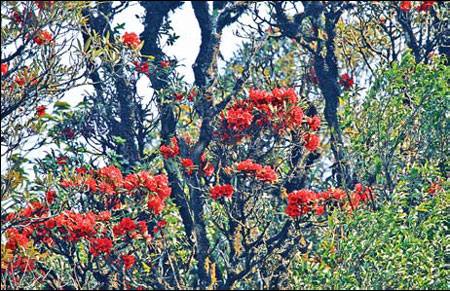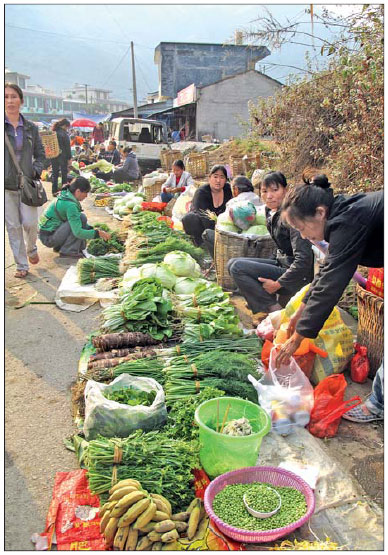Share Your Experience
Refreshingly beautiful
Updated: 2011-05-12 07:56
By Chen Liang (China Daily)
|
Visitors can enjoy the beautiful scenery while taking a dip in the steaming waters of Zaotang He hot spring. Photos by Chen Liang / China Daily |
|
Rhododendron in full bloom on Gaoligong Mountain. Ai Huaisen / for China Daily |
|
A market near Baihualing is a showcase for local vegetables and fruits. |
Gaoligong Mountain offers a pristine environment for climbing, exploring ancient Southern Silk Road trails and bathing in natural hot springs, Chen Liang discovers.
As a frequent visitor to hot springs I have a few favorites, but among the best is undoubtedly Zaotang He (Bathhouse River) in Baoshan, Yunnan province, which is tucked away in the scenic and fairly remote Gaoligong Mountain valley.
When I first visited Zaotang He in the summer of 1996, it involved trekking a steep trail for three hours down into the valley before I could enjoy my dip - and a near four-hour climb back up the mountain afterward.
It's better now. The trail has been widened and paved with stone, while the hot spring itself is a chain of three circular pools built on the riverbed. Hot spring water bubbles out of the riverbed while cold water is channeled in to adjust the temperature for bathing.
In other respects it is the same, a beautiful site, unspoiled, free of charge and little known.
In early April, along with a friend from Baihualing village at the foot of Gaoligong Mountain, we decided to visit the spring in the morning, correctly thinking it would be unlikely for anyone else to visit before noon.
It took us just an hour to descend into the valley to the river, walking from temperate forest into subtropical jungle. Huge trees, wild bananas, vines and shrubbery covered the valley.
Three waterfalls upstream of the hot spring cascaded down sheer cliffs. The biggest waterfall, hidden deep in the valley, could be seen along the trail, while the other two are just meters away from the spring pools and create a stunning audio-visual backdrop to the bathing experience.
I wore trunks and bathed in the biggest pool, but my friend was more adventurous and stripped down to his birthday suit. Lying on the bubbling sandy riverbed, listening to birds chirping on a flowering tree, was like heaven.
The main reason for my visit to Gaoligong, however, was to traverse the mountain along the Southern Silk Road from Baihualing on the mountain's eastern slope to another village on the western slope, in Tengchong county.
The road along the tea route was formerly a network of horse caravan paths winding through the mountains of Sichuan and Yunnan provinces. From around 1,000 years ago, it was a trade link from Yunnan, one of the major tea-producing regions, to India via Myanmar, and to Tibet and central China via Sichuan.
The path from Baihualing cuts through Gaoligong Mountain National Nature Reserve and is one of the best-preserved sections of the ancient route. It features a tough 12 km climb from about 2,000 meters above sea level to a mountain pass with an elevation of 3,250 meters, followed by a descent of several kilometers to Tengchong.
My plan was to reach the pass, spend the night and arrive in Tengchong the next day. However, reserve administration officials at Baihualing told me that camping was no longer permitted in the reserve, in order to preserve the environment and protect its wildlife.
This meant I had to complete the journey in a day, get up at 4 am and hike more than 10 hours, in addition to hiring a horse and guide for my luggage.
I was then disappointed to learn the trail was blocked by fallen trees, so the only option left was to explore the trail in Baihualing.
I hired a Baihualing villager, Duan Shenghong, as my guide.
Without the pressure of scaling the mountain pass, the climb was fairly easy and pleasant, through beautiful forests, covered in deep green lichen and various kinds of epiphytic orchids. Although the optimum flowering season is January to February, there were colorful flowers everywhere, including exuberant cherry and rhododendron that were in full bloom.
The trees attracted birds and giant squirrels, as big as small dogs, with 1 meter-long tails. These chubby mammals feed on flowers and it was a joy to behold them frolicking in the tree cover above.
We reached Huangxingshu, the final terrace beneath the pass, at noon. Duan said the average city visitor would take at least three hours to make the difficult climb to the mountain pass.
Sitting beneath a flowering cherry tree, enjoying the sunshine and my packed lunch, I was actually a little relieved that we would not have to make this ascent.
Duan told me he earned about 4,000-5,000 yuan ($433-541) a year guiding hikers. To the pass, he charges 150 yuan per day, and to Tengchong, 50 yuan more.
"These are the standard prices agreed to by the reserve administration," he said.
On our return, he found a tree near a stream with purple shoots that sprout like the toon trees in Beijing. Hesitating for a while, the 44-year-old picked the shoots and stuffed them into his bag.
"They are edible in spring, tender and delicious," he admitted.
"I haven't hunted or logged in the reserve for more than 15 years. Generally, I don't dare forage in the reserve because it's prohibited, but there are so many delicious wild plants in Gaoligong it's truly hard to resist their temptations!"
His reasoning was easy to understand, especially after I accidentally ran into a weekend market near Baihualing village, while I was leaving for Baoshan airport. My taxi was stuck in a traffic jam caused by the market, one of the liveliest I have seen.
A number of exotic foraged wild plants were on sale. So were strange fruits and pickled vegetables, honeycombs, green bean curd, fish and chicken. They looked fresh, organic and tantalizing. I had to envy the choice of natural ingredients the locals enjoyed.
Most of the vendors and their customers were women, who wore colored headbands and bags made of various materials. The market was a showcase of the area's natural diversity.
So, besides the hot spring I love and the mountain pass I failed to climb, I have another reason to return - to try those exotic fruits and vegetables, which you would be hard-pressed to find anywhere else.
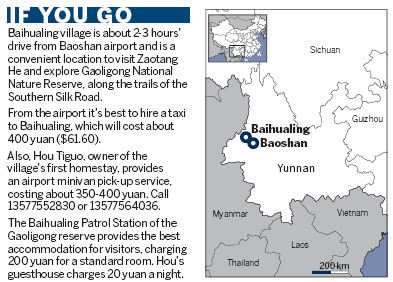
(China Daily 05/12/2011 page19)
E-paper

Thawing out
After a deep freeze in sales during the recession, China’s air conditioner makers are bouncing back
Cool Iron lady
Of good and evil
Build on security initiatives
Specials
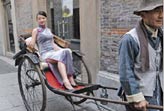
Memory lanes
Shanghai’s historic ALLEYS not just unique architecture but a way of life

Great expectations
Hong Kong-born singer songwriter rises to the top of the UK pops.

A diplomat of character
Belgian envoy draws on personal fascination to help build China ties.
